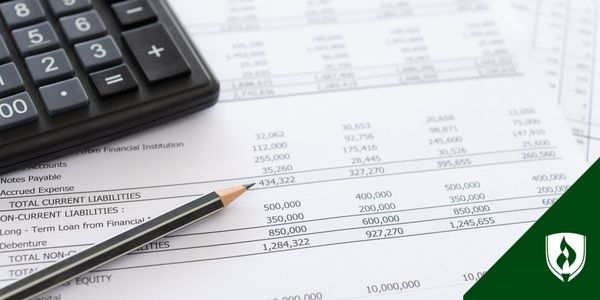
If you're interested in helping others to keep track of their finances and make business decisions about their financial well-being, a degree in accounting may be right for you. Afterall, an accounting degree isn't just about math. It will teach you about financial planning, corporate finance and data analytics.
Accountants handle everything from tracking income and expenses to making business and tax preparation plans. They're also the source that businesses look to help them assess their financial health. There's a lot to learn in this field.
If you are wondering... can you get an accounting degree online, the answer is absolutely YES! But these programs aren't for everyone.
"Far too often, students see that a class, program or degree is online and think that somehow makes it easier," says Rasmussen Accounting Instructor, Roxanne Visser. "But actually, the opposite is true."
An online program is really made for a self-motivated learner. There's no required class meeting every Tuesday evening to attend. No pop quiz potential that needs to be prepared for. No embarrassment in front of your classmates if the teacher asks a question you don't know how to answer, Visser explains.
"Because these extrinsic factors don’t exist in most online programs, it's much easier to take the day or week off from studies and deal with it later, when that’s really not in the student's best interest,” Visser says.
"If you’re considering earning an education online, I would strongly recommend you first decide if you’re going to be able to motivate yourself to study and learn," Visser says.
Consider some pros and cons, ask yourself some clarifying questions about your intended career--and then see how to best evaluate any online accounting program you are considering.
The pros and cons of earning your accounting degree online
Some universities and colleges offer online accounting degrees. If you're trying to decide between attending school in-person or online, there are many factors to consider.
Pro: A more elastic schedule
Many online accounting degree programs are asynchronous. That means you can complete your work at any time during the week that it's assigned, as long as you adhere to the deadlines.
This means you can fit your accounting class assignments in with your other work/life responsibilities.
Con: Less accountability
If you're the type of person who prefers the structure of a physical classroom and presence of professors to buckle down and work, you may want to consider an in-person or a hybrid program.
"Earning any degree online takes time, patience and perseverance, as well as self-dedication and discipline," Visser says.
Online programs work best for students who are very self-motivated and who can keep themselves on a schedule.
Pro: Exposure to peers from around the country
Participating in an online university means you get to meet people from diverse walks of life and professions that you might not otherwise encounter in person.
Con: Fewer social opportunities
Although many online universities have student clubs, it's not the same as being on a campus. Before choosing a school, check out what in-person and/or remote options they have to meet other students with similar interests.
Pro: A degree is a degree
Some students worry about how their online degree will be perceived in the workforce. Employers have continued to hire candidates from both settings. Nearly 90% of employers have hired graduates with an online degree or credential, according to the National Association of Colleges and Employers Job Outlook 2024 study.1
Each employer will have their own hiring requirements. It is important to check with employers regarding their educational requirements.
Making the most of your online accounting degree program
If you're entering an accounting degree program, there are several steps you can take to maximize what you get out of your online education.
Build a schedule
Create a study schedule that meets your learning goals while balancing your other work and life obligations. Be sure you plan in some time for fun and relaxation, as well as for the unexpected and unknowns.
Ask for help
If there are topics or assignments you find confusing, reach out to your instructor for clarification.
"Classes might be hard. There might be topics or assignments that are confusing," Visser says. "REACH OUT to your instructor for clarification or examples! We are here to help you through the struggles! And there WILL be struggles, but that’s where the most passion and learning will come from!"
Make connections
"While education and learning are essential, building a community and networking is also a very important part of your education," says Visser.
"Participate in the student lounge and general course chat areas of classes to build connections with your classmates and instructors,” Visser advises. “If you’re comfortable, try making a few friends in your online classes. If you have a core group of friends with common interests and goals, you are more likely to enjoy your time in college and hopefully build some industry contacts and lifelong friendships.”
Learn inside and outside of the classroom
"Anytime there are opportunities for involvement outside the classroom, I recommend those,” adds Visser.
“At Rasmussen University, for example, we have the Rasmussen Leadership Academy, RasMuse Student Anthology and other opportunities for students to be involved and enhance their experience outside of class,” Visser says.
Expand your horizons
"Accounting is often falsely thought to not change very much over time," Visser says. "However, we are seeing so much change in how artificial intelligence is supporting our roles. We need to be prepared to continuously learn and practice use of this dynamic tool, and to embrace how it can enhance our roles.
"Overall, students of accounting should be prepared to be lifelong learners,” Visser says. “This involves taking in professional development sessions, seminars and classes to support their roles and their organizations as situations arise."
Here are a few things to help you navigate your way to an online accounting degree for your needs.
Can you get an accounting degree online at any level?
There are different levels of education you can pursue in this industry. You could start with just a certificate program, for example. Or you could get a full-fledged doctoral degree in accounting--it really runs the whole spectrum.
Accounting certificate
Students looking for entry into an accounting career will want to start with learning the basics of accounting, including accounting principles.
Accounting certificates include courses that will help you learn to prepare financial statements and tax returns, and expose you to common accounting software tools. Bookkeepers and accounting clerks might have an accounting certificate, where they've gained knowledge about accounts receivable, accounts payable and general ledgers.
These programs are shorter and often made for someone who already has work experience or a degree in another field. If that might be you, get more details on an accounting certificate program.
Accounting associate’s degree
If you're interested to gain foundational knowledge in accounting without a huge time commitment, an associate degree may be right for you. These programs cover generally accepted accounting principles (GAAP) and related topics.
Accounting students in these programs discover how to prepare tax returns, create financial statements and maintain accounting records. They graduate with the knowledge to pursue work as an accounting clerk or auditing clerk. Check out the specifics for an associate's degree in accounting program.
Accounting bachelor’s degree
With a bachelor of science in accounting, you can gain skills in:
- Account reconciliation
- Bookkeeping
- Financial reporting
- Managerial accounting
- Payroll
Accounting majors in bachelor’s degree programs graduate with the knowledge to help businesses with budgeting and forecasting. Many accountant, auditor, financial analyst, managerial accounting, and accounts payable/accounts receivable roles require a bachelor's degree in accounting.
Check out the specifics for a bachelor's degree in accounting.
Accounting master’s degree
A master's degree in accounting provides comprehensive knowledge of accounting principles, financial regulations and tax concepts. In these accounting programs, students gain the financial acumen to prepare for leadership roles or to take the certified public accountant (CPA) exam, depending on the program. Often actuaries, budget analysts, controllers and forensic accountants have a master's degree in accounting.
Rasmussen University does not offer a master's degree program in accounting.
Ph.D. in accounting
Earning the highest degree in accounting is typically for those looking to have the advanced skills for leadership positions or for professorships. Having a Ph.D. in accounting prepares you to teach accounting courses or conduct research in the field. It's common for an auditor, a chief financial officer, finance manager or a professor of finance to have a Ph.D. in an accounting program.
Rasmussen University does not offer a doctoral degree program in accounting.
What kind of accountant can you become with an online degree?
Different programs have different strengths, and knowing a bit about where you want to end up will help you choose the right path.
If you are interested in financial accounting or working in the private sector, Rasmussen's Accounting programs might be a good fit. These programs can help you become a certified management accountant® (CMA®).
But if you want to work in the public sector as a certified public accountant (CPA), you'll want to look at another institution for that credential.2
Are you interested in specializing?
In addition to core accounting curriculum, you may want to take specialized courses, depending on your area of interest. You may not yet know what you are interested in either--that's part of the fun of working through a program.
"You are going to love some classes, and you’re going to like others much less," Visser says.
"Give each class a fair chance and know that not everything needs to be your favorite! Personally, managerial accounting is not my favorite area,” Visser laughs. “So, I have taken positions in my career that are more geared towards the financial accounting side of the profession. It’s ok to find your niche!"
Online accounting degree programs may offer courses in topics such as...
Information systems
Accounting information systems (AIS) brings together accounting knowledge with software skills. An accounting degree with a concentration in AIS is ideal for someone interested in pursuing data-driven and tech-driven roles in accounting.
Rasmussen University does not offer any accounting programs which have a specialization in Accounting Information Systems.
Forensic accounting
The discipline of forensic accounting involves scrutinizing financial records to identify potential fraud or compliance issues. Forensic accounting professionals usually work for law enforcement agencies or large corporations, where they investigate suspicious financial activity.
Rasmussen University does not offer any accounting programs which have a specialization in Forensic Accounting.
Managerial accounting
Managerial accounting is the process of transforming raw financial data into intelligence that business leaders can use. These professionals provide a deep dive into the how and why of an organization's financial picture. These insights help organizations to make well-informed decisions about improving their financial position.
Rasmussen University does not offer any accounting programs which have a specialization in Managerial Accounting.
Important questions to ask about online accounting degrees
If you're considering enrolling in an online accounting degree program, there are many questions you'll want to ask up front.
Write some of these down, contact any school you are considering, and get the answers. This can help you find out which programs meet your standards.
- How does the course schedule work? Can I submit assignments at any time during the week?
- What is the length of the program?
- How can I transfer credits? Universities may offer course credits for previous college classes and military experience.
- How can I meet other accounting majors as well as other professionals outside the classroom? Ask about student clubs, online volunteer opportunities or leadership opportunities where you can connect with other students.
- Will earning my degree help me to prepare for certification examinations?
- What is the cost per class? What financial aid opportunities are available to me?
- What academic support does your university provide?
- Do you offer job placement support for accounting majors?
- What core accounting classes do you offer?
- Do you offer any concentrations for online accounting degrees?
Talk to an admissions representative before you enroll
An online program will make it easy for you to enroll over the computer. But it's always a good idea to contact someone before you do. Talk to a representative and make sure you understand how the program will work.
You can get answers to the logistic information you need as well as advice for your specific situation. Check out Rasmussen University's online accounting program options and click on the yellow "request more information" button. When you submit the form, an admissions representative will email or call you (based on your preference) to answer your questions.
It's a good way to decide if this is right for you.
NACE® is a registered trademark of National Association of Colleges and Employers
Certified Management Accountant® is a registered trademark of Institute of Certified Management Accountants
CMA® is a registered trademark of Institute of Certified Management Accountants
1NACE® Job Outlook 2024, (Nov.2023), 2024-nace-job-outlook.pdf
2Rasmussen University’s Accounting Associate’s degree, and Accounting Bachelor’s degree programs are not designed to prepare graduates for any state-issued professional license or certification. These programs do not meet all educational prerequisites for licensure as a Certified Public Accountant (CPA) in any state. Each state determines its own requirements for licensure as a Certified Public Accountant (CPA). Please consult with your state’s board of accountancy or equivalent oversight agency for further details, as requirements may change at any time. These programs have not been approved by any state board of accountancy or other professional licensing agency




